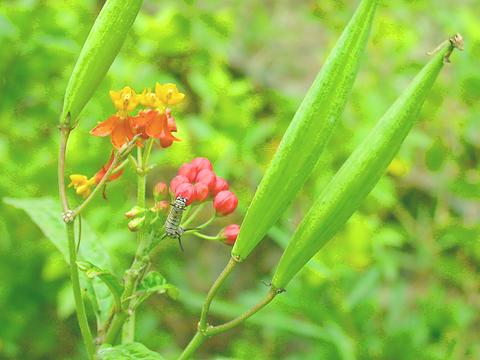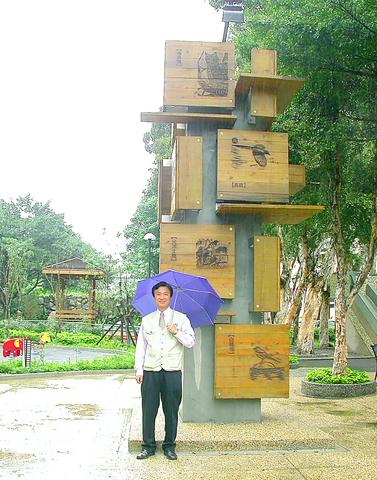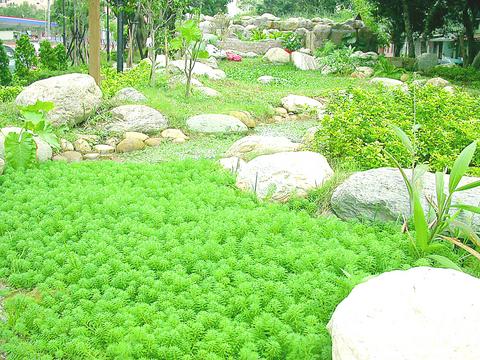The 5,700 residents of Taipei's Fujin Borough (
evenings and its expansive meadow where children could play. In downtown Taipei, these were luxuries.
Then, four years ago, a plan began to take shape that would turn Fumin Park into Fumin Ecological Park (

The park's remodelling was the first urban development project in Taipei to have been initiated not by city authorities, but by the residents themselves. The idea was so popular, in fact, that Taipei Mayor Ma Ying-jeou listed the project as one of the 12 major achievement of his first term. And borough residents themselves were so enamored with the idea that they were willing to wait two years -- two years without any park at all -- so that the lengthy redesign could be completed.
Mixed reviews
Many were not happy with the final result. Although some residents approved of it and volunteered to nurse the plants and insects in the ecological zone, others were appalled by what they saw once the final shape of the park became apparent in March. The days leading to the park's official opening on Jan. 1 have seen a heated debate over whether the park's new incarnation is a blessing or a curse for the community.

PHOTO: VICO LEE, TAIPEI TIMES
The park's ecological zone was made to simulate the marshy areas of the Red Forest (紅樹林) in Taipei County's Guandu Plain Ecological Park (台北縣關渡生態公園). Several species of butterflies, frogs and small fish were introduced into the park along with plants they could eat.
"This was the first ecological park in a heavily urban area. Unlike other [ecological] parks, there were many problems because ours was in the middle of a city. We had to build a natural environment from scratch. But I believe that as long as we provide the environment, the animals will come," Lee said.
The re-construction was not without its problems. "It's the first of its kind. So the government gave us little help because they were as inexperienced as we were. Ecological parks in urban environments are a totally new concept. I hope other communities will follow suit," Wang, who is currently seeking another term as borough warden, said. A photo of the completed park appears on his campaign flyer.

PHOTO: VICO LEE, TAIPEI TIMES
Much of the work to maintain the park is done by the community. Currently there are 67 volunteers who look after its natural areas. And these are still waiting to be trained in the art of ecological maintenance.
Elementary school teacher Wang Mei-yin (
Although the park received the Urban Planning Landscape award (
"We would rather give the ecological park to other neighborhoods. This is not the right place for it. We have too little space," Peng said.
For the birds
Although they support the park, Authorities admit it is far from perfect. "There are a lot of problems. The ponds are muddy and the water is stagnant. What we can do is clean up the place regularly, although that does not address the root of the problem," Lin Shin (林信), chief of the parks department's Yuanshan precinct, said in reference to flaws in the construction.
Another point of controversy is the designer's plan to attract migratory birds to the park. "I have not see one migratory bird in the park, and neither have my neighbors," Wang Lin-lin (
"For migrating birds to stop by a place, it has to have a fairly large area where they can keep at a safe distance from humans. Second, there has to be an abundance of food," Wang Huei-mei (王惠美), who has been volunteering at the Wild Bird Federation Taiwan (野鳥學會) for the past 15 years, said. "In an urban environment it's not impossible, but quite improbable that migrating birds will stay. There's too much human activity."
According to Wang, even the ecological area at Ta-an Park, Taipei's largest, has only one migratory bird; most likely one that's lost its way.
Residents also complain that the park's artificial hill, valley and cliff have bad feng shui.
"The old park was much better, it was simple, flat and contiguous. My granddaughter used to play in the park, and my friend and I would sometimes walk through it. I don't see anyone doing that nowadays," said Mrs. Chiu, a 70-year-old who lives in an apartment facing the park.
"Ecological parks are a very high-level thing. They meant well. We know that, but we cannot use the park the way we want," Chiu's husband said.
"Parks are for children and the elderly to go to. That's what parks are for. We have no use for an ecological park. It does nothing for us, and it's not pretty either," Mrs. Chang, Chiu's neighbor, said.
The park does indeed look rather plain, as the usual flowers have been removed to make space for plants that attract wildlife.
"It all comes down to people's choices between providing a place for nature or reserving it for themselves. It's also a choice between the place's educational function and its recreational function," Guo Chung-ying(郭瓊瑩), chairwoman of the Chinese Institute of Landscape Architects (中國景觀學會), said.
Electioneering
Addressing resident's complaints, Guo said: "Now that it's an ecological park, residents need to be informed and educated so they can look at the park from a new angle. They cannot keep on thinking of it as the park they used to have. For example, weeds should be gotten rid of in a [normal] park, but they are an integral part of an ecological park," Guo said.
According to Guo, it will take at least couple of years to get the park into shape. "It's about building up the whole food chain. In a city where there's interference from humans, this takes longer. Ecological parks don't happen overnight," she said.
While admitting that the park left much to be desired, Guo, one of the judges on the committee that gave the urban planning award to the park, defended those who planned it.
"We gave the award to the park project partly to recognize the courage of the borough office. It's difficult to manage an ecological park. They were the only ones who dared to. There will always be people blaming and pointing fingers before any positive results can be seen," she said.
The park's future depends on the outcome of the upcoming borough warden elections, scheduled for Jan 4.
"It simply cannot possibly be an ecological park. I will give it back its old face," Peng Chun-hua (

That US assistance was a model for Taiwan’s spectacular development success was early recognized by policymakers and analysts. In a report to the US Congress for the fiscal year 1962, former President John F. Kennedy noted Taiwan’s “rapid economic growth,” was “producing a substantial net gain in living.” Kennedy had a stake in Taiwan’s achievements and the US’ official development assistance (ODA) in general: In September 1961, his entreaty to make the 1960s a “decade of development,” and an accompanying proposal for dedicated legislation to this end, had been formalized by congressional passage of the Foreign Assistance Act. Two

March 31 to April 6 On May 13, 1950, National Taiwan University Hospital otolaryngologist Su You-peng (蘇友鵬) was summoned to the director’s office. He thought someone had complained about him practicing the violin at night, but when he entered the room, he knew something was terribly wrong. He saw several burly men who appeared to be government secret agents, and three other resident doctors: internist Hsu Chiang (許強), dermatologist Hu Pao-chen (胡寶珍) and ophthalmologist Hu Hsin-lin (胡鑫麟). They were handcuffed, herded onto two jeeps and taken to the Secrecy Bureau (保密局) for questioning. Su was still in his doctor’s robes at

Last week the Democratic Progressive Party (DPP) said that the budget cuts voted for by the China-aligned parties in the legislature, are intended to force the DPP to hike electricity rates. The public would then blame it for the rate hike. It’s fairly clear that the first part of that is correct. Slashing the budget of state-run Taiwan Power Co (Taipower, 台電) is a move intended to cause discontent with the DPP when electricity rates go up. Taipower’s debt, NT$422.9 billion (US$12.78 billion), is one of the numerous permanent crises created by the nation’s construction-industrial state and the developmentalist mentality it

Experts say that the devastating earthquake in Myanmar on Friday was likely the strongest to hit the country in decades, with disaster modeling suggesting thousands could be dead. Automatic assessments from the US Geological Survey (USGS) said the shallow 7.7-magnitude quake northwest of the central Myanmar city of Sagaing triggered a red alert for shaking-related fatalities and economic losses. “High casualties and extensive damage are probable and the disaster is likely widespread,” it said, locating the epicentre near the central Myanmar city of Mandalay, home to more than a million people. Myanmar’s ruling junta said on Saturday morning that the number killed had